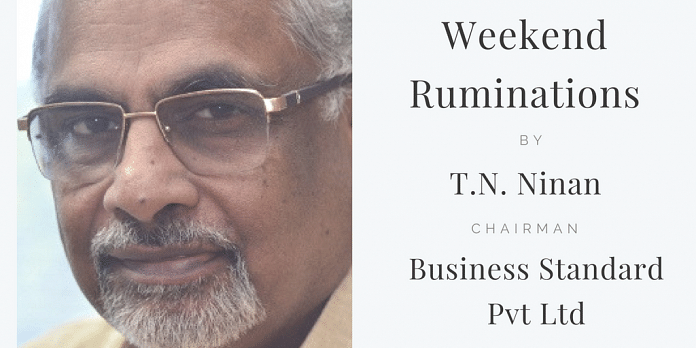There isn’t much to choose between BJP and opposition parties when it comes to their record of undermining constitutional principles.
T.N. Ninan
The problem with looking at issues in the country from a specific community’s perspective (or from that of just one political formation) is that you miss the larger, more pervasive picture. Only the wilfully blind will seek to deny the truth in the outgoing vice-president’s assertion that Muslims feel insecure. But, surely, the reason why the police go easy on cases of cow vigilantism is the same as why the police treat a case of attempted abduction of a young woman as one involving lesser crimes, and on that basis let a drunk young man from an influential family go home instead of being sent to the lock-up and subjected to a blood and urine test. Both show that the police routinely look to their political bosses for a signal on what they should or should not do. The issue is not Muslims, it is the functioning of the police.
Similarly, if the Central Bureau of Investigation or some other prosecuting arm of the state picks on politicians from the opposition parties, or lets off politicians who happen to be in power, you miss the larger point if you define the problem as a particular government led by a particular political party misusing the state’s coercive power. The uncomfortable truth is that all political parties have done the same, at the Centre and in the states. In this and the police matter, the problem is that the permanent executive has been compromised and suborned by the political executive. That fact is neutral to the issue of which party is or has been in power.
The political violence in Malabar, with brutal killings of both Communists and activists of the Rashtriya Swayamsevak Sangh (RSS) should not be treated like the counting of votes: Which side suffered more killings than the other. The operative question is one of governance: Why has the state government not stopped the killings? A corollary is why it happens that West Bengal is the other state with a culture of political violence. The RSS has often been accused of stoking communal flare-ups, but is violence deployed as a political tool by just one group? No one should have the luxury of the position adopted by Lyndon Johnson, who once declared: “He may be a son-of-a-bitch, but he is our son-of-a-bitch!”
There is that other great divide, on the basis of secularism. But people across the country can see that far too many people who swear in the name of secularism one day have crossed over to the non-secular side the next, or joined hands across the floor. The only parties not to have done so are the Congress and the Communists, but the number of Congressmen now crossing over would suggest that, whether you like it or not, this is an issue with less and less traction. And who would argue that the Muslims, for instance, have not been led by communal elements? Sometimes the speck in the other’s eye can look bigger than the beam in your own.
It is no different when it comes to the autonomy of the official broadcaster. L.K. Advani as minister of information and broadcasting in the Morarji Desai government set the ball rolling on autonomy, in response to the censorship of the Emergency. Parliament passed the bill when the V.P. Singh government (supported by the BJP) was in office. Yet, today under the BJP dispensation the national broadcaster is pretty much the same kind of government mouthpiece as it was under Indira Gandhi. This should remind one of the old saw that the difference between an honest man and a crook is merely a question of opportunity.
If that sounds cynical, blame the extent of hypocrisy in evidence. If the opposition parties believe that the BJP is out to undermine the principles on which the Constitution rests, and would like political contestation to be on that important question, they had better start behaving as though they believe in those principles.
T.N. Ninan is Chairman of Business Standard Pvt Ltd.
By Special Arrangement with Business Standard







Expectations will always be higher from the government than from the opposition. That is why incumbents are often voted out.